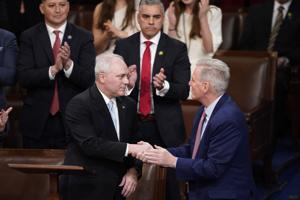
“We’re here to let energy out of the box,” said Rep. Bruce Westerman, R-Hot Springs, Arkansas, the chair of the Natural Resources committee.
The TAPP Act also includes provisions that would streamline – or gut, in critics’ view – procedures in the 53-year-old environmental protection law and thereby decrease the amount of time needed to complete highway and other projects that receive federal funds.
U.S. Rep. Garret Graves, R-Baton Rouge, wrote a provision that would make environmental assessments required under the National Environmental Policy Act of 1970, called NEPA, take less time, be simpler to review, and be less exposed to lawsuits. He has said that past red tape and lawsuits have meant at least seven years of delays on major flood control and other projects.
In addition to increasing the states’ portion of federal royalties and streamlining permitting reviews, the TAPP Act would immediately compel quarterly lease sales for energy exploration on federal lands and offshore; require an updated five-year plan for energy production; and roll back the fee increases on energy lease sales imposed during the Biden administration.
In addition to increasing the states’ portion of federal royalties and streamlining permitting reviews, the TAPP Act would immediately compel quarterly lease sales for energy exploration on federal lands and offshore; require an updated five-year plan for energy production; and roll back the fee increases on energy lease sales imposed during the Biden administration.
The goal of the TAPP Act is to deliver projects quicker and resume new energy leasing and production in places such as the Gulf of Mexico, which would provide more funding for Louisiana’s hurricane protection, coastal restoration and flood control efforts.
“This bill is going to allow us to not take five, six, seven years to build projects,” Graves said in a brief interview during a break in the committee hearing. “It’s going to reduce the cost associated with environmental compliance. And I would argue it’s actually going to force focus more on true environmental implications, and not all of these other ancillary non-environmental things that have gotten baked in over decades.”

Leave a Reply